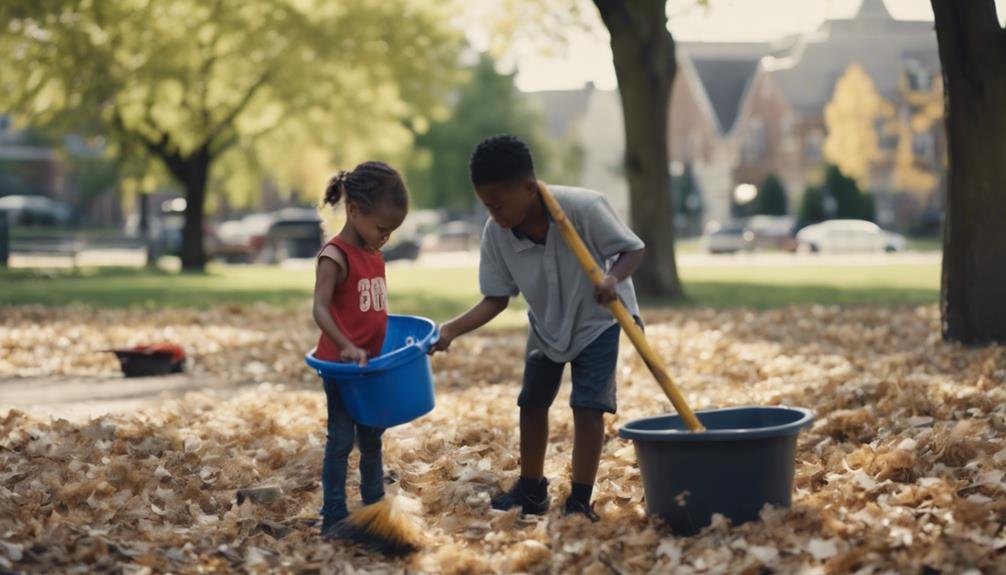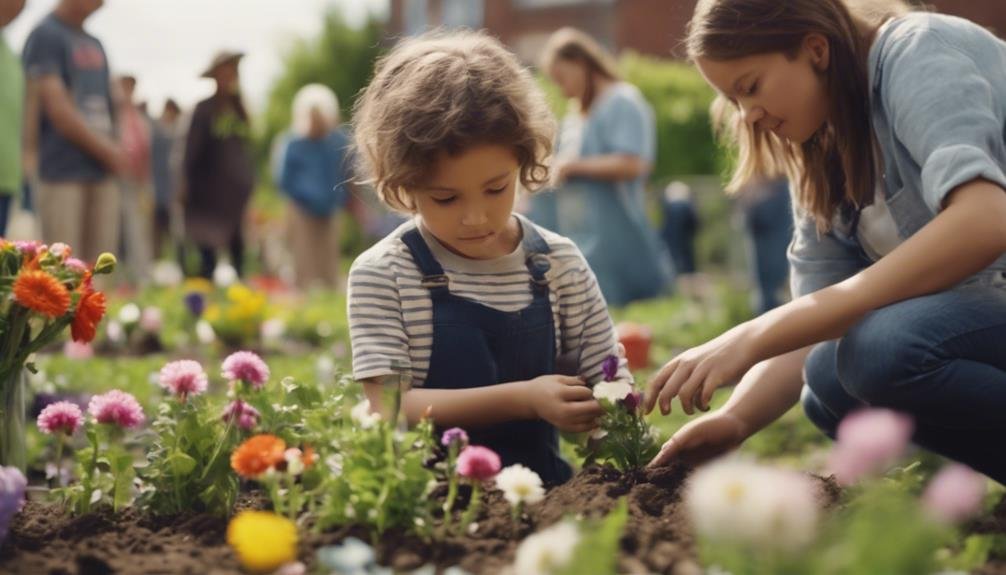Encouraging Your Child to Participate in Community Service
Imagine your child spending weekends volunteering at a local animal shelter, helping care for abandoned pets. This kind of experience not only benefits the community but also has a profound impact on your child's personal development.
Encouraging your child to engage in community service activities can lead to numerous positive outcomes, from fostering empathy and responsibility to building essential social skills.
But how exactly can you support your child in taking these vital steps towards becoming an active and compassionate member of society?
Key Takeaways
- Foster empathy, responsibility, and belonging through community service.
- Develop compassion, social skills, and emotional intelligence.
- Instill responsibility, connection, and integrity in your child.
- Create lasting memories and motivation for continued involvement.
Importance of Community Service

Encouraging your child to participate in community service can foster empathy, responsibility, and a sense of belonging in their local area. By engaging in community service activities, your child can make a significant social impact and contribute to the well-being of others. It instills a sense of civic engagement, teaching them the importance of actively participating in the community to address various needs and issues.
Through community service, your child can develop a deeper understanding of the world around them, cultivating empathy towards those who may be less fortunate. It provides them with valuable life lessons, teaching responsibility and the importance of giving back to society. Additionally, participating in community service can help your child build meaningful connections with others in their local area, fostering a sense of belonging and interconnectedness.
Encouraging your child to engage in community service not only benefits those they're helping but also helps them grow into compassionate, responsible individuals who actively contribute to making the world a better place.
Developing Empathy and Compassion
To foster empathy and compassion in your child, consider how engaging in community service activities can broaden their perspective and understanding of others' experiences. By actively participating in service projects, your child can develop a deeper sense of empathy towards those in need and cultivate compassion for individuals facing various challenges. Encouraging your child to step outside their comfort zone and interact with diverse communities can greatly impact their emotional intelligence and interpersonal skills.
| Benefits of Community Service for Empathy and Compassion | Description | Impact |
|---|---|---|
| Exposure to different perspectives | Learn about varied life experiences | Broadens understanding |
| Hands-on help to those in need | Directly assist individuals in challenging situations | Fosters compassion |
| Building connections with the community | Develops a sense of belonging and responsibility | Strengthens empathy |
Engaging in community service not only benefits those being helped but also plays an important role in your child's empathy development and compassion cultivation. By actively participating in service activities, they can learn to relate to others' feelings and experiences, fostering a sense of interconnectedness and kindness towards all.
Fostering Responsibility and Connection

How can you instill a sense of responsibility and foster meaningful connections in your child through community service engagement?
Teaching accountability and independence is key. Encourage your child to take ownership of their commitments, whether it's showing up on time for volunteer activities or following through on tasks they've been assigned. By holding them responsible for their actions, you help them understand the impact they can have on others through their service.
Cultivating belonging and engagement is equally important. Encourage your child to actively participate in community service projects, interact with different people, and immerse themselves in the experience. This can help them develop a sense of connection to the community and the people they're helping. Encourage them to share their thoughts and feelings about their volunteer work, fostering deeper connections and empathy towards others.
Benefits for Personal Growth
Instilling a sense of responsibility and fostering connections through engaging in community service can lead to significant personal growth opportunities for your child. By participating in community service activities, your child can develop self-awareness and enhance their leadership skills. Here are four key ways community service can contribute to your child's personal growth:
- Self-awareness: Through volunteering, your child can gain a deeper understanding of their strengths, weaknesses, and values. This self-reflection can help them grow personally and develop a clearer sense of self.
- Leadership skills: Engaging in community service allows your child to take on responsibilities, make decisions, and guide others. These experiences can nurture their leadership skills and boost their confidence in leading others.
- Empathy: By interacting with individuals from diverse backgrounds and communities, your child can cultivate empathy and a greater appreciation for the world around them.
- Personal satisfaction: Contributing to the community can instill a sense of fulfillment and purpose in your child, fostering their overall well-being and personal growth.
Building Social Skills

Encouraging your child to engage in community service activities can be a valuable way to help them develop essential social skills. Through participating in such activities, your child has the opportunity to enhance their communication skills by interacting with a diverse group of individuals. They learn to express themselves clearly, listen actively, and collaborate effectively with others.
Teamwork dynamics play a vital role in community service projects. Your child will experience firsthand the importance of working together towards a common goal. They'll learn how to delegate tasks, support their peers, and navigate through different opinions to achieve a shared objective. These experiences can help them build strong relationships, enhance their problem-solving abilities, and cultivate empathy towards others.
Making a Difference in the Community
Engaging in community service activities empowers your child to make a positive impact on the community around them. By participating in volunteer work, your child can truly understand the value of giving back and helping those in need. Here are a few ways your child can contribute to community change:
- Direct Interaction: Encourage your child to engage directly with the community by volunteering at local shelters, food banks, or community events. This hands-on approach allows them to witness firsthand the impact of their actions.
- Skill Development: Volunteering offers your child the opportunity to develop new skills and strengths, fostering personal growth while making a difference in the lives of others.
- Building Connections: Through community service, your child can build meaningful relationships with people from diverse backgrounds, broadening their perspective and understanding of the world.
- Inspiring Others: By actively participating in community service, your child can inspire their peers and family members to also get involved, creating a ripple effect of positivity and change in the community.
Instilling Values and Ethics

To guide your child towards a strong moral compass and ethical decision-making, emphasize the importance of honesty and empathy in their interactions with others. Values reinforcement begins at home through open discussions about what it means to be truthful and to contemplate others' feelings.
Encourage your child to analyze the impact of their actions on those around them, fostering empathy and a sense of responsibility. Model ethical behavior yourself, showing them through your actions how to navigate moral dilemmas with integrity.
Teach your child to cherish honesty by praising their truthfulness and addressing any instances where they may have been less than truthful. Emphasize the importance of empathy by encouraging them to ponder how others may feel in different situations.
Creating Lasting Memories
Creating lasting memories with your child involves engaging in meaningful activities that strengthen your bond and create cherished moments to look back on. As a parent, you play a vital role in shaping these experiences that will stay with your child for a lifetime. Here are some ways to create lasting memories through community service:
- Bonding Experiences: Participate in volunteer activities that require teamwork and collaboration, such as organizing a charity event or working together at a local shelter.
- Meaningful Connections: Take the time to talk to your child about the impact of their actions on others, fostering empathy and understanding.
- Shared Moments: Capture the special moments you spend together during community service in photos or a journal to reflect on later.
- Impactful Projects: Choose projects that align with your child's interests or passions to make the experience more meaningful and memorable.
Finding Suitable Opportunities

When looking for opportunities for your child to engage in community service, consider their interests and skills to find suitable projects that resonate with them. It is crucial to match their passions with meaningful service projects. Volunteer matching services can be a great starting point, connecting your child with opportunities tailored to their preferences and abilities. By involving your child in the decision-making process, they are more likely to feel invested and committed to the cause they are supporting.
| Volunteer Organization | Service Project | Location |
|---|---|---|
| Local Food Bank | Food distribution | Community Center |
| Animal Shelter | Pet care | Shelter |
| Environmental NGO | Beach cleanup | Coastal area |
| Senior Care Facility | Companionship | Nursing Home |
| Youth Mentorship Program | Tutoring | Community Center |
Supporting Your Child's Involvement
Engage with your child to understand their motivations and concerns about participating in community service, fostering a supportive environment for their involvement. It's essential to provide the right kind of support to keep them engaged and motivated.
Here are some ways to support your child's involvement:
- Parental Encouragement: Offer words of encouragement and praise for their efforts in community service. Let them know you're proud of their commitment.
- Volunteer Options: Help your child explore different volunteer opportunities that align with their interests and skills. This way, they can engage in activities they're passionate about.
- Motivating Involvement: Continuously remind your child of the positive impact they're making in the community through their service. Share stories of how their contributions have helped others.
- Community Impact: Discuss with your child the broader impact of community service, emphasizing how their actions can bring about positive change and inspire others to get involved.
Frequently Asked Questions
How Can Parents Balance Their Child's Participation in Community Service With Their Academic Responsibilities and Extracurricular Activities?
You can balance community service, academics, and extracurriculars by mastering time management and prioritizing tasks. Help your child create a realistic schedule that allows for all commitments. Encourage open communication to address any challenges that arise.
Are There Any Safety Precautions or Guidelines Parents Should Consider Before Allowing Their Child to Participate in Community Service Activities?
When allowing your child to engage in community service, safety precautions are vital. Establish guidelines to guarantee their well-being, such as location verification, supervision checks, and emergency contact information. Prioritize their safety above all.
What Resources Are Available for Parents to Help Their Child Choose a Meaningful and Impactful Community Service Project?
When helping your child choose a community service project, start by exploring their interests. Evaluate impact potential together. Utilize online platforms, local organizations, and school resources for options. Offer parental support and guidance in time management.
How Can Parents Address Any Potential Resistance or Reluctance From Their Child Towards Participating in Community Service?
Addressing resistance: Acknowledge your child's feelings, listen actively to their concerns, and have an open dialogue about the benefits of community service. Building motivation: Highlight the positive impact they can make and involve them in project selection.
What Strategies Can Parents Use to Help Their Child Reflect on Their Experiences and Learn From Their Community Service Involvement?
Reflect on experiences through open, meaningful conversations. Engage in reflection exercises together. Ask open-ended questions, listen actively, and share your thoughts. Encourage self-discovery and learning. Connect their service to personal growth.
Conclusion
To sum up, encouraging your child to participate in community service is like planting seeds in a garden – you nurture them to grow into something beautiful and impactful.
By fostering empathy, responsibility, and social skills, you're helping them become well-rounded individuals who contribute positively to society.
So, support your child's involvement in community service and watch them blossom into compassionate and ethical individuals who make a difference in the world.








